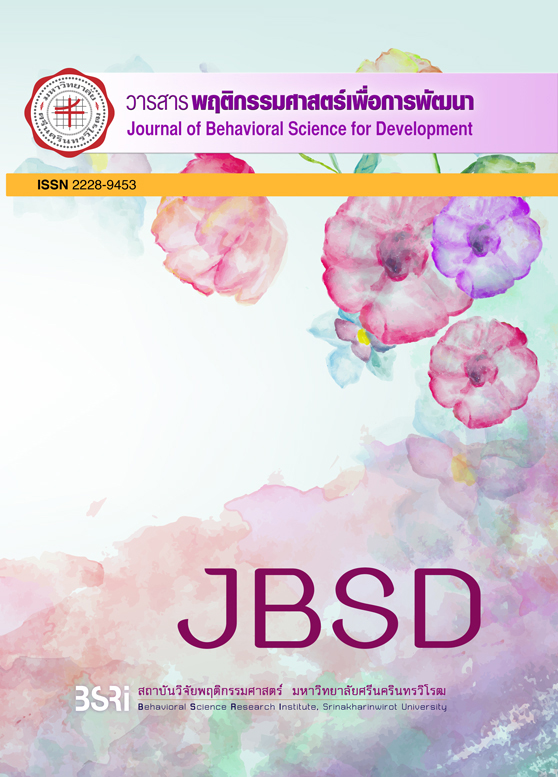Antecidents and Consequences of Sciencetific Curious Behavior of Junior Secondary Students
Abstract
ปัจจัยเชิงเหตุและผลของพฤติกรรมใฝ่รู้ใฝ่เรียนวิชาวิทยาศาสตร์ของนักเรียนมัธยมศึกษาตอนต้น
Abstract
This study aims at investigating psychological and situational factor influencing learning behavior in science subject of junior secondary school(consisted of 2 behaviors : Mindful of science Learning behavior and seeking knowledge of Science behavior) . There are Three objectives in this study. First to examine the influence of situation factors. Secondly, to study the influence of Psychological factors. Finally, to find important predictors of learning behavior in science subject. Sample of this study is the 400 students in schools under Bangkok Education Service Area Office 2. Based on the Interactionism Model as a conceptual framework. Three-Way Analysis of Variance, Hierarchical Multiple Regression were used to analyze the data. Research findings were as follows. 1) The student who have high sciencetific mind ,high commitment to education in field of science ,high self-efficiency and loved-reasoned oriented child rearing practice ,will have high mindful of science learning behavior 2) The student who have high commitment to education in science and high democratic class, will have high seeking knowledge of science behavior 3) The independent variables in the study 3 groups is social situational factors (loved-reasoned oriented child rearing practice, Democratic class and time for science studying), psychological traits(self efficiency, ego identity and sciencetific mind), and psychological states( attitude towards science and commitment to education in field of science) could predict 3.1) Mindful of science learning behavior 32.3 percent. The important predictor is loved-reasoned oriented child rearing practice, sciencetific mind and commitment to education in field of science 3.2) Seeking knowledge of science behavior 19.2 percent. The important predictor is democratic class, time for science studying, attitudes toward science and commitment to education in field of science 4) Seeking knowledge of science behavior can predict science achievement with 9.5 percent in total sample and with the highest percentage of 11.3 percent in high economic status.
Keywords: Sciencetific Curious behavior, Mindful of Science Learning behavior
บทคัดย่อ
จุดมุ่งหมายของงานวิจัยนี้เพื่อศึกษาปัจจัยเชิงเหตุด้านจิตสังคมและปัจจัยเชิงผลด้านผลสัมฤทธิ์ทางการเรียนวิชาวิทยาศาสตร์ที่เกี่ยวข้องกับพฤติกรรมใฝ่รู้ใฝ่เรียนวิชาวิทยาศาสตร์ (ซึ่งประกอบด้วยพฤติกรรมย่อย 2 พฤติกรรม ได้แก่ พฤติกรรมตั้งใจเรียนวิชาวิทยาศาสตร์ และพฤติกรรมแสวงหาความรู้วิชาวิทยาศาสตร์ ) ของนักเรียนชั้นมัธยมศึกษาตอนต้น ในสังกัดสำนักงานเขตพื้นที่การศึกษามัธยมศึกษา เขต2 กรุงเทพมหานคร โดยกลุ่มตัวอย่างเป็นนักเรียนมัธยมศึกษาตอนต้นจำนวน 400 คน ใช้รูปแบบทฤษฎีปฏิสัมพันธ์นิยมในการกำหนดตัวแปรเชิงเหตุ และใช้สถิติวิเคราะห์ความแปรปรวนแบบสามทาง และวิเคราะห์ถดถอยพหุคูณแบบมีลำดับขั้น ผลวิจัยพบว่า 1) นักเรียนที่มีพฤติกรรมตั้งใจเรียนมาก พบในกลุ่มนักเรียนที่มีจิตวิทยาศาสตร์มาก นักเรียนที่มีความมุ่งมั่นในการศึกษาต่อในสาขาวิทยาศาสตร์มาก มีความเชื่ออำนาจในตนมาก หรือได้รับการอบรมเลี้ยงดูแบบรักสนับสนุนและใช้เหตุผลในครอบครัวมาก 2) นักเรียนที่มีพฤติกรรมแสวงหาความรู้มากพบในกลุ่มนักเรียนที่มีความมุ่งมั่นในการศึกษาต่อในสาขาวิทยาศาสตร์มาก และมีบรรยากาศประชาธิปไตยในชั้นเรียนมาก 3) ตัวแปรที่ทำการศึกษาไม่สามาถทำนายพฤติกรรมตั้งใจเรียนวิชาวิทยาศาสตร์ได้ร้อยละ 32.3 พฤติกรรมแสวงหาความรู้วิทยาศาสตร์ได้ร้อยละ 19.2 และผลสัมฤทธิ์ทางการเรียนได้ร้อยละ 9.5
คำสำคัญ: พฤติกรรมใฝ่รู้ใฝ่เรียนวิชาวิทยาศาสตร์ พฤติกรรมตั้งใจเรียนวิชาวิทยาศาสตร์ พฤติกรรมแสวงหาความรู้วิชาวิทยาศาสต


